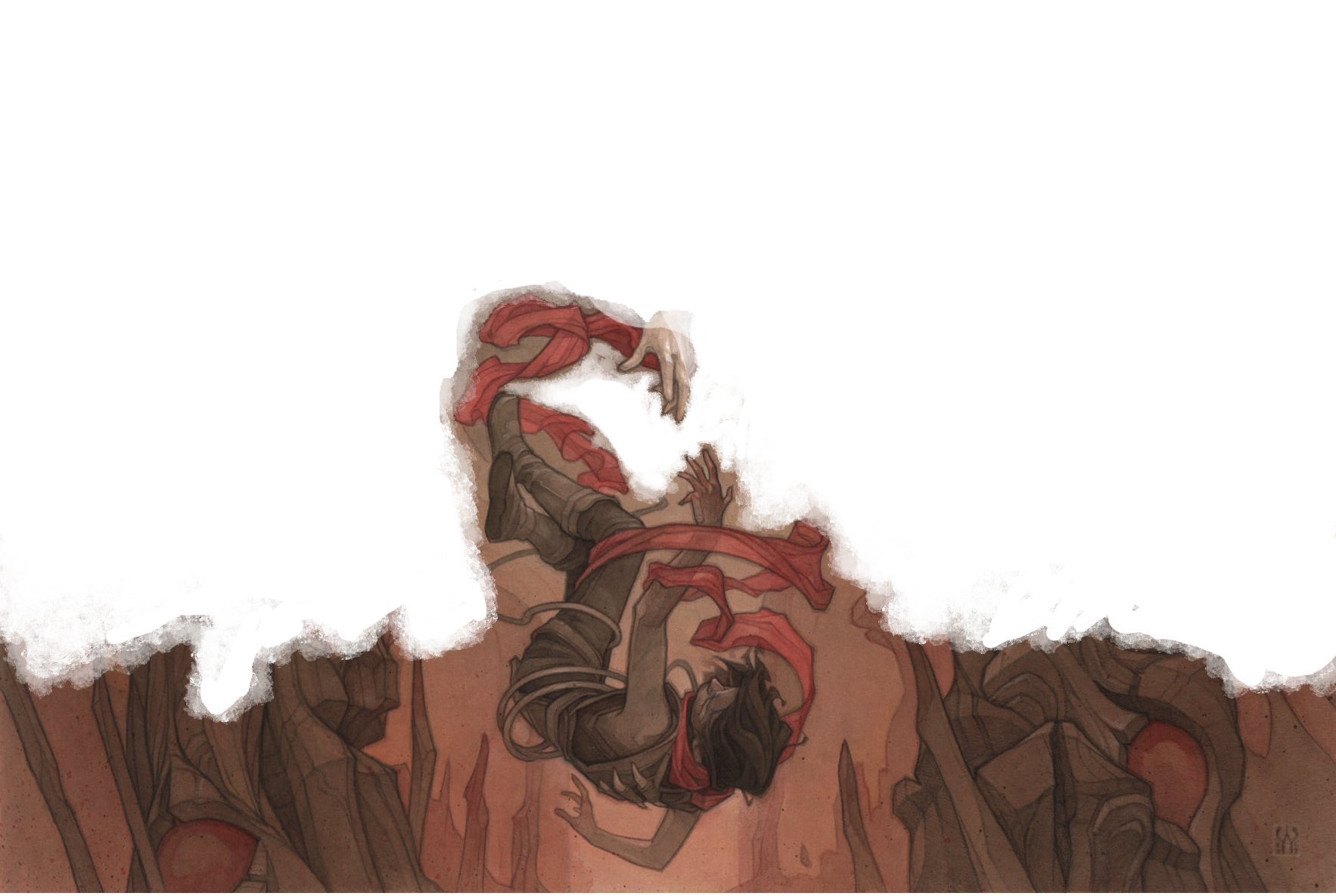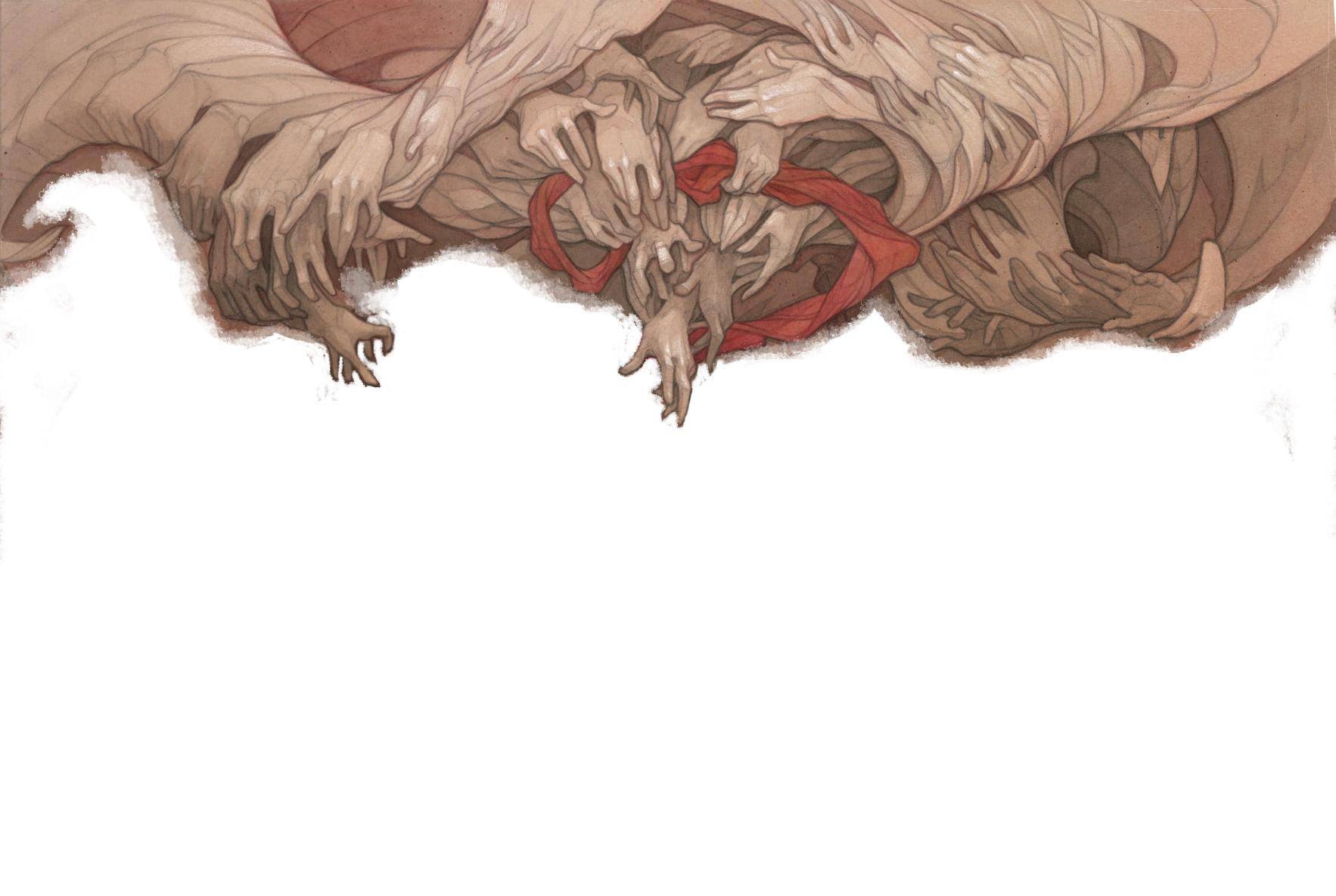Trailblazer
Is strength not enough?. This thought trudged through the ogre's tired mind for the very first time in her life.
Force was her livelihood, the club was her key. But no matter how hard she hit, this foe would not break. Its unnatural focus stayed her blows. Its presence crushed her own. The ogre shook off her worries by landing a satisfying thonk on a sneaky gnome. However, her joy became pain as the troublesome one sliced her from behind.
The last sight her fading eyes took in was the warrior, bruised yet fiercer for it, raising its weapon. She could not escape a final truth as the blade pierced her one last time.
In a way, it brought her peace. I see. Strength enough. Me just weak. And then she was no more.
Trailblazers forge their own path, pursuing what they want with a willful single-mindedness. Their inner flame drives them onward, unceasingly. While confident in their own prowess, trailblazers are at their best on a team, using either intellect or persona to connect allies and disrupt enemies.
Unbridled Determination
Traitor. Crusader. Heretic. Hero. Trailblazers can have many names, but they all come from a strong drive to accomplish. This flame that burns within is what defines the trailblazer.
No cliff is to steep, and no monster too fierce, for a trailblazer to give up before the fight has started. And when the fight does start, they make their presence known, more than making up for any lack of proper training. Even failure itself serves only as a reminder to be more ready for the next chance to overcome adversity.
At the Forefront
Trailblazers harbor deep commitments, which can range from noble ideals to selfish pursuits. An inspiring ruler, fighting for a valued cause. An embattled rebel, striving to topple a brutal government. A pragmatic adviser, steering others toward the sensible path. An idealistic reformer, speaking their truth regardless of the consequences. Each might even be pitted against the other, working tirelessly towards their own goals. History may remember only one, but all four changed the world they left behind.
Creating a Trailblazer
When creating a trailblazer character, think about your origin. What are you set on accomplishing, and why? Was there a defining moment in your life that pushed you to become who you are now? You are set apart by your ever-burning flame and your intense presence. This came from somewhere, and it’s fueling something.
With the help of your dungeon master, try to fit your origin into the game as much (or as little) as you are comfortable with, whether your goal is providing for your own orphanage, searching for lost treasure to enrich yourself, or campaigning to end a war after your friends died because of it.
Defining Feature: Guiding Presence
While all trailblazers carry themselves with an inexhaustible fire, how they channel that flame differs. Some harness their tact and knowledge, while others choose to forge ahead with an inspiring passion. This choice does not alter the class's basic characteristics, but it does provide bonus features and lead to unique ethoses. It also defines the ability score of your guiding modifier, which is used in various trailblazer features.
Shrewd Presence
These trailblazers use Intelligence to analyze the battlefield and choose the best course of action. They can be competent conversationalists, but are best when engaging enemies.
Valiant Presence
These trailblazers use Charisma to fight at the forefront, aiding allies while attacking. Outside of combat, they are capable speakers, able to draw in and inspire others.
Quick Build
You can make a trailblazer quickly by following these suggestions, depending on your Guiding Presence.
Shrewd: Choose noble as your background. Make Dexterity your highest ability score, followed by Intelligence.
Valiant: Choose folk hero as your background. Make Strength your highest ability score, followed by Charisma.
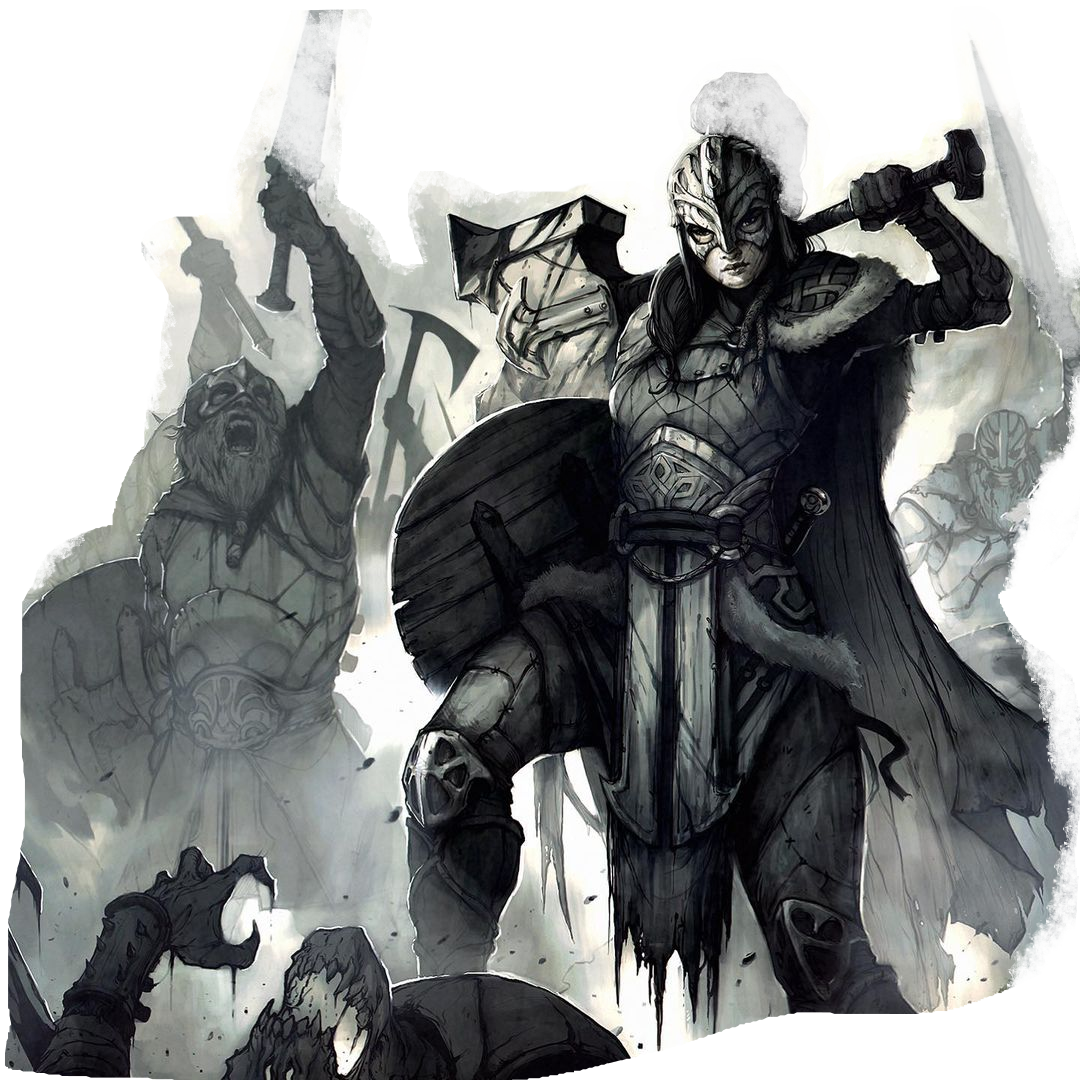
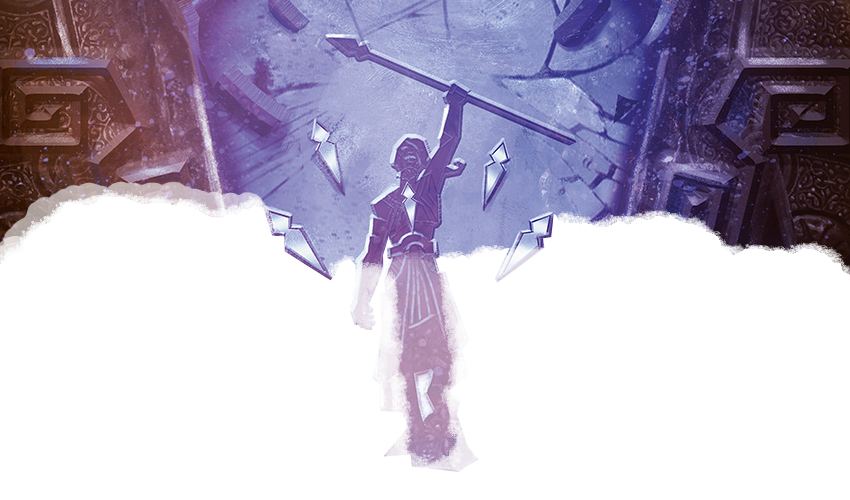
Trailblazer
| Level | Proficiency Bonus | Flame Die | Mindsets | Feature |
|---|---|---|---|---|
| 1st | +2 | 1d4 | -- | Flame, Resourceful Speaker, Trail Maker |
| 2nd | +2 | 1d4 | 1 | Focus Flame, Mindsets |
| 3rd | +2 | 1d4 | 2 | Ethos, Wordsmith |
| 4th | +2 | 1d4 | 2 | Ability Score Improvement |
| 5th | +3 | 1d6 | 3 | Extra Attack |
| 6th | +3 | 1d6 | 3 | Ethos feature, Smoldering Flame |
| 7th | +3 | 1d6 | 3 | Extra Effort |
| 8th | +3 | 1d6 | 3 | Ability Score Improvement |
| 9th | +4 | 1d6 | 4 | Surging Flame |
| 10th | +4 | 1d6 | 4 | Quick Recovery |
| 11th | +4 | 1d8 | 4 | Ethos feature, Improved Mindsets |
| 12th | +4 | 1d8 | 4 | Ability Score Improvement |
| 13th | +5 | 1d8 | 5 | Improved Focus Flame |
| 14th | +5 | 1d8 | 5 | Improved Extra Effort |
| 15th | +5 | 1d8 | 5 | Ethos feature |
| 16th | +5 | 1d8 | 5 | Ability Score Improvement |
| 17th | +6 | 1d10 | 6 | Igniting Flame |
| 18th | +6 | 1d10 | 6 | Bulwark |
| 19th | +6 | 1d10 | 6 | Ability Score Improvement |
| 20th | +6 | 1d10 | 6 | Ethos feature |
Class Features
As a trailblazer, you gain the following class features
Hit Points
- Hit Dice: 1d8 per trailblazer level
- Hit Points at 1st Level: 8 + your Constitution modifier
- Hit Points at Higher Levels: 1d8 (or 5) + your Constitution modifier for every level after 1st
Proficiencies
- Armor: light armor, medium armor, shields
- Weapons: simple weapons, 2 martial weapons of your choice
- Tools: none
- Saving Throws: Wisdom (see Guiding Presence for second)
- Skills: Choose one of Acrobatics, Athletics, Deception, History, Insight, Investigation, Persuasion, or Survival
Guiding Presence
Choose either Shrewd Presence or Valiant Presence, which are described in more detail in the class introduction above.
Shrewd Presence
Your Intelligence modifier is your guiding modifier, and you prioritize attacking enemies. Gain the following proficiencies.
- Saving Throws: Intelligence
- Skills: choose one Intelligence-based skill, such as Religion
Valiant Presence
Your Charisma modifier is your guiding modifier, and you prioritize helping allies. Gain the following proficiencies.
- Saving Throws: Charisma
- Skills: choose one Charisma-based skill, such as Intimidation
Equipment
You start with the following equipment, in addition to the equipment granted by your background:
- (a) a chain shirt or (b) leather armor
- (a) a martial melee weapon or (b) two simple weapons
- (a) a ranged weapon with 20 ammo or (b) a shield
- (a) a diplomat's pack or (b) an explorer's pack
Flame
At 1st level, you build your presence in battle, then harness its power. When in combat, you can choose to become ablaze at any point. While ablaze, you have advantage on saving throws against being charmed or frightened, and you build a flame die, a d4, at the start of each of your turns. You also build a flame when you critically hit or succeed on a saving throw. You can have a total number of flames built at once equal to your guiding modifier (minimum of 1).
You can extinguish flames to exert your presence, rolling a flame die for each spent flame. You start knowing three such ways to use flames: Scorch, Smoke, and Ember.
You cannot concentrate on spells while ablaze. If you are knocked unconscious, or if your turn ends and you haven't attacked a hostile creature since your last turn, or haven't extinguished a flame since then, you stop being ablaze and lose all flames. In order to regain the ability to become ablaze, you must either hit a hostile creature or spend a minute energizing yourself without interruption.
Your flame die changes when you reach certain levels of trailblazer, as shown in the class table's Flame Die column.
Scorch
If you hit a creature with a weapon, you can extinguish one or more flames to increase your damage roll.
Smoke
If a creature hits you, you can extinguish a single flame to raise your AC against the attack, potentially making it miss.
Special: Ember
Your flame also reaches beyond the battlefield. If you have no flames built and succeed on a meaningful saving throw or ability check while outside of combat, build a flame.
A flame built this way lasts for ten minutes or until combat starts. As an action, you can extinguish the flame, allowing a creature you can communicate with to add a flame die to the next ability check or saving throw it rolls in the next minute.
Flame Feature: Focus Flame
At 2nd level, you can spread your flame to friends and foes, affecting them with your presence. When you move within 5 feet of a friendly creature, you can focus your presence on it. If the creature is prone, it can use its reaction to stand. Friendly focuses can extinguish your own flames to use the Scorch or Smoke features on themselves.
When you attack a hostile creature, you can focus on it. If your attack hits, you also gain advantage on your next ability check against it. If an attack misses a hostile focus, you can extinguish a single flame to decrease its AC against the attack. If a hostile focus hits with a weapon, you can use one or more flames to reduce its damage roll.
You can only be focused on one hostile and one friendly creature at once. Your focus and any benefits granted by it expire if you lose track of your focus or you stop being ablaze.
As part of this feature, you also gain a Focus Style.
Shrewd-only bonus: If you reduce the damage of a hostile focus, you can add your Intelligence modifier to your roll.
Valiant-only bonus: If you focus on a friendly creature on your turn and it uses or has used its reaction, it regains it.
Focus Style
As part of Focus Flame, choose one of the following, which represents your method of interacting with focuses. Once you use the feature, you can't use it again until your next turn.
At 13th level, your focus style no longer requires a reaction.
Accomplice
When a friendly focus attacks a creature, quickly attack the same creature as a reaction. This attack's damage is halved.
Challenger
When a hostile focus attacks or casts a harmful spell on a creature other than you, melee attack it as a reaction.
Duelist
When a hostile focus deals damage to you, quickly attack it as a reaction. This attack deals halved damage.
Tactician
When a hostile focus attacks you at disadvantage and misses, or forces you to roll a save at advantage and you succeed, attack it with advantage as a reaction.
Flame Feature: Smoldering Flame
At 6th level, your embers burn indefinitely. When you have no flames and spend a minute to energize yourself, build a flame. Also, any flame built out of combat lasts until you take long rest and doesn't go out when combat starts.
Flame Feature: Surging Flame
At 9th level, you draw sudden strength from your own life force. While ablaze, you can turn a hit die into a built flame as a bonus action. If your current health is below your trailblazer level, roll the spent hit die and gain that many hit points.
Flame Feature: Igniting Flame
At 17th level, your flame burns brighter than ever. Build two flames at the start of your turn while ablaze, instead of one.
Resourceful Speaker
Also starting at 1st level, your actions can speak just as well as your words. You can communicate simple ideas through gestures to any creature whose culture you have a basic understanding of, even if you don't speak its language.
You are also capable of expressing yourself clearly through a mix of gestures, facial expressions, and symbols with any creature you have spent at least a week with, or have spent at least a day forming a strong bond with.
Shrewd: You have a knack for language. Learn languages equal to half of your Intelligence modifier, rounded up.
Valiant: Your expressiveness draws others in. Add a flame die to any Charisma skill checks made to attract attention.
Trail Maker
You refuse to lose, even to nature. At 1st level, when you fail a saving throw or ability check against natural obstacles, such as steep cliffs or noxious fumes, you can choose to reroll. On a failure, succeed anyway, but gain a level of Exhaustion.
When you succeed, you pave the way for others. Grant any creatures attempting or about to attempt to overcome the same obstacle a bonus equal to your guiding modifier.
Mindsets
At 2nd level, you gain access to mindsets, which grant more ways to use flame. Choose one mindset, shown at the end of the class. You gain additional mindsets as you gain levels in trailblazer, as shown in the class table.
All of your mindsets improve starting at 11th level.
Communicating Resourcefully
Being able to communicate simple ideas without language might seem useful, but what exactly does "simple idea" mean? Think of it like this: If you could say it in three or fewer syllables, it probably counts: I am friend. You want food? Danger, run!
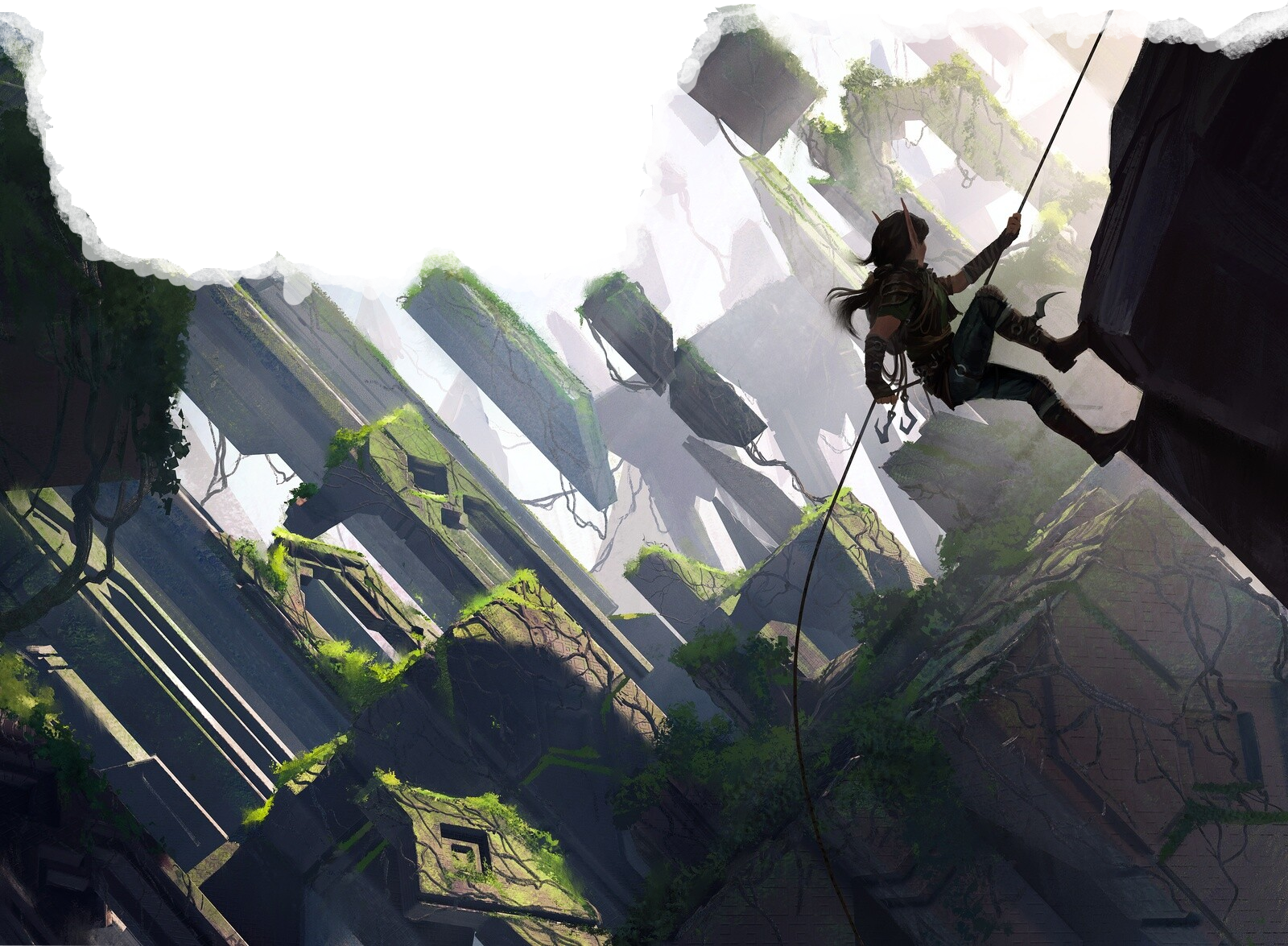
Ethos
At 3rd level choose an ethos, which defines how you fight and what you aspire to be. Pick Diehard, Firebrand, or Steward. Depending on your guiding presence, you can alternatively choose Guerilla, Visionary, Apostle, or Emblem, all detailed at the end of the class descriptions. The Ethos you choose grants you a feature at 3rd, 6th, 11th, 15th, and 20th level.
Wordsmith
Starting at 3rd level, your speech is sharpened by experience. Gain proficiency in Deception, Performance, or Persuasion.
Shrewd: You can also choose to use Intelligence as your ability modifier for one of the skills listed above.
Valiant: If you already have proficiency in your chosen skill, you can gain expertise in it instead.
Ability Score Improvement
When you reach 4th level, and again at 8th, 12th, 16th, and 19th level, you can increase one ability score of your choice by 2, or you can increase two ability scores of your choice by 1. As normal, you can’t increase an ability score above 20 using this feature.
Extra Attack
Beginning at 5th level, you can attack twice, instead of once, whenever you take the Attack action on your turn.
Extra Effort
At 7th level, you push twice as hard to escape any outward constraints. At the start of your turn, you can roll a saving throw against one effect that you would roll a save for at the end of your turn. Failing this saving throw cannot cause an effect to worsen or progress, and you still roll a save against the effect at the end of your turn if necessary.
At 14th level, your fortitude becomes even stronger. You have advantage on all saving throws to end ongoing effects.
Quick Recovery
Starting at 10th level, you steel yourself against your body's inadequacies. Gain proficiency in Constitution saving throws as well as advantage on saving throws against disease.
You can now finish a long rest in 4 hours, 2 of which must include sleep (or trance if available). Alternatively, you can take an 8 hour long rest. If you do, gain the benefits of two consecutive long rests for effects such as regaining spent hit dice and removing stacks of Exhaustion.
Shrewd: When you heal with hit dice, you can reroll the hit die, but must use the new outcome.
Valiant: When you heal with hit dice, you can instead choose to grant the healing to a creature within 5 feet of you.
Bulwark
At 18th level, as long as you are not incapacitated, you are immune to being knocked prone against your own volition.
In addition, your influence on the battlefield is heightened.
Shrewd: Hostile focuses within 10 feet of you cannot attack or roll saving throws with advantage.
Valiant: Friendly focuses within 10 feet of you cannot be forced to attack or roll saving throws with disadvantage.
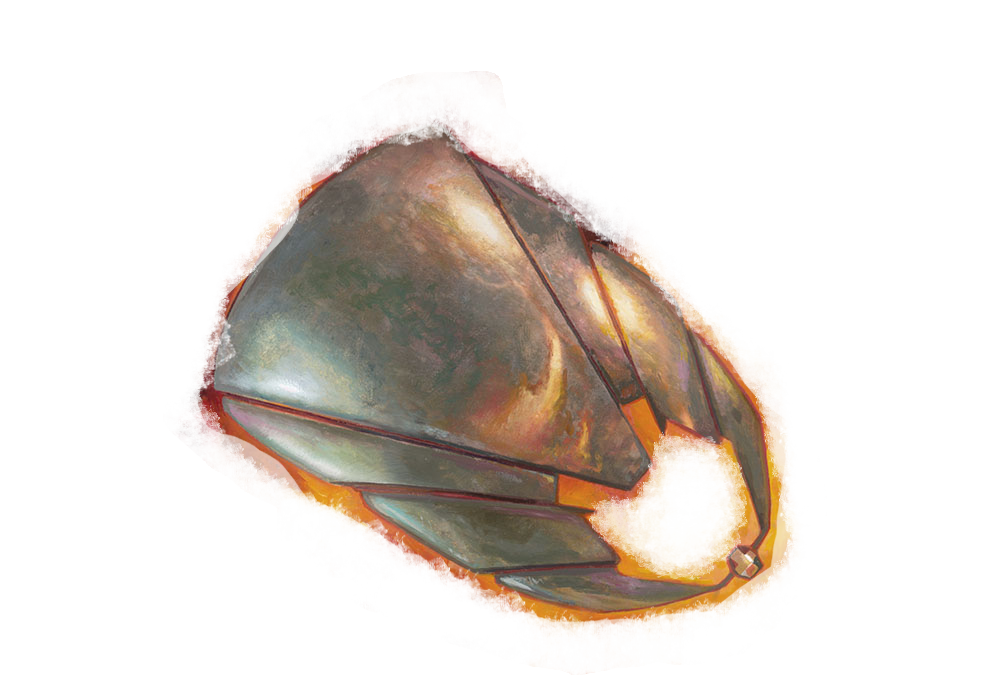
Ethoses
Flame is shared by all trailblazers, but how they use that flame differs greatly. Choose an ethos that reflects your goals or aligns with your methodology.
While the Diehard, Firebrand, and Steward are available regardless of which Presence you chose, both the Guerilla and Visionary ethoses are unique to Shrewd Presence, while the Apostle and Emblem are unique to Valiant Presence.
Diehard
Deny death? No. Accept it, and then defeat it as just another adversary. Diehards are stubborn to a fault, clinging to their path and their life even in the most desperate of situations.
Grazing Blow
Beginning at 3rd level, you fend off attacks with vigor. When you use a flame to increase your own AC, you can reroll any 1s until the result is no longer a 1.
You also have a knack for noticing when an attack is close to hitting, causing it to become a grazing blow. If you or a friendly focus extinguishes a flame to increase its AC and is still hit, all damage from the attack is halved. Likewise, if you extinguish a flame to decrease a hostile focus's AC and the attack still misses, the attack does half damage.
You can use this feature a number of times equal to your guiding modifier (a minimum of once). You regain all uses after finishing a long rest.
Shrewd: When you graze a hostile focus, you can apply effects, such as the Disorient mindset, that require you to hit.
Valiant: When you are grazed, the attacker cannot apply effects, such as poison, that require the attack to hit you.
Resilient Body
Starting at 6th level, your hit point maximum is increased by 1 for each level you have in trailblazer. Your body can be subjected to harsh climate conditions with no effect, and can handle pain and most forms of torture without flinching.
If you prove this to a creature with an Intelligence above 5, such as by holding your hand directly over an open fire, you gain advantage on Intimidation checks against it, but take 1d4 damage of the appropriate type.
Headstrong
Starting at 11th level, you push yourself to recover just as much as you push yourself to survive. When you roll to gain health or temporary hit points, add a flame die to the result.
Shrug It Off
At 15th level, you quickly become accustomed to repeated blows. After you are dealt non-magical bludgeoning, piercing, or slashing damage, you can gain resistance to that type of damage as long as you are ablaze. You can only have one resistance granted by this feature at once.
Shrewd: If you are hit by a hostile focus, you can gain the resistance immediately, instead of after the damage is dealt.
Valiant: Friendly focuses gain the same resistance you do.
Never Say Die
At 20th level, you simply refuse to die. If your health would fall to 5 or less hit points, it falls to 5 instead. Whenever you take damage while your health is at 5 or below, but still above 0, you lose a single point of life instead.
If you are healed or granted temporary hit points while in this state, you lose the benefit of this feature until you finish a long rest. You can choose to ignore any healing or temporary hit points granted while this feature is in effect.
Firebrand
Speech is wasted by those who use it only to utter dry facts and boring logic. Firebrands know better. They manipulate allies and enemies as they see fit, compelling them by force of presence to follow paths they would otherwise not consider.
Force of Presence
Some firebrand features call for a creature to make a saving throw. If the creature is willing, it can choose to fail.
Save DC: 8 + your proficiency + your guiding modifier
Inciting Movement
At 3rd level, your presence compels others. As a bonus action, force a creature that can see or hear you to roll a Wisdom saving throw. If it fails, it must use its reaction to move half its speed in a straight line direction of its choice, as long as there is a path that lacks obvious dangers. Attacks against it are at disadvantage during this movement.
You can use this feature a number of times equal to your guiding modifier (a minimum of once). You regain all uses after finishing a long rest.
Shrewd: Whenever a hostile focus is moving, any attacks against it are made at advantage.
Valiant: Whenever a friendly focus is moving, attacks against it are made at disadvantage.
Agitator
Starting at 6th level, you know how to stir up others to unruly behavior. When making a skill check to convince others to do something brash or disruptive, you can roll at advantage.
In addition, you are skilled at causing turmoil. If you are in a crowded area, you can spend the next minute setting the scene for a disruption. As long as you are not stopped before the minute passes, your next skill check attempting to cause chaos in this area can be rerolled until the die is above a 15.
Fiery Disposition
At 11th level, when you roll a flame die, you can reroll it, but must keep the new result. Once you use this feature, you cannot use it again until the start of your next turn.
Provoke Recklessness
Starting at 15th level, you can enrage a creature, causing it to lash out in unpredictable ways. Once per turn, when you focus on a creature, you can provoke it, forcing it to roll a Wisdom saving throw. If it fails, it must use its reaction to attack a hostile creature within its range.
If the attack misses, the next attack against the provoked creature has advantage.
Shrewd: If a provoked hostile focus misses you, you can redirect its attack to any creature in its range and within 10 feet of you. The redirected attack is made at disadvantage.
Valiant: If a provoked friendly focus misses, it can redirect its attack to any creature in its range and within 10 feet of its target. The redirected attack is made at disadvantage.
Formidable Bravura
At 20th level, you smile in the face of danger. When you are about to roll a saving throw caused by a hostile creature, you can force that creature to roll a Wisdom saving throw. If the creature fails and you succeed, it becomes shaken by your display of confidence. Until the end of the creature's next turn, you automatically succeed on all saving throws it forces you to roll, and you cannot be targeted by its attacks.
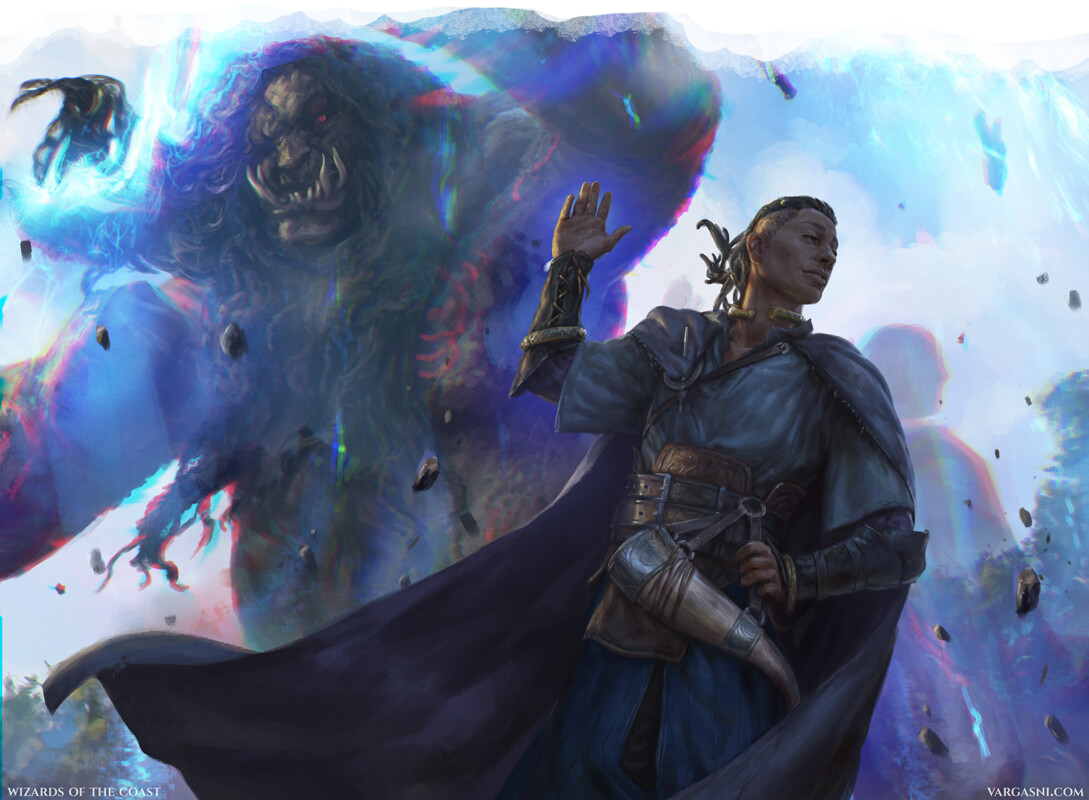
Shrewd Presence: Guerilla
The best fight is one where the win is assured. Guerillas seek victory where they can, however they can. And while they might not lead from the front, their presence is noticed by all.
There In Spirit
At 3rd level, you gain a spirit, an intangible projection of your will that can influence the flow of battle. You can use any trailblazer features that requires you to be within a certain range as if you were standing in the location of your spirit, though you must still be able to see or hear any targets.
It starts in the same location as you, and can be moved by spending your own movement. It cannot be attacked or otherwise interrupted, but will return to your location if you move or become incapacitated. Your spirit cannot use actions.
Additionally, you can hide as a bonus action as long as you are ablaze. While hidden, moving will not disrupt your spirit.
Renegade's Savvy
Beginning at 6th level, your ability to read others' intentions is near impeccable. When you are engaged with a creature regarding a deal, request, or pledge, you can gain the initial effects of the 2nd level spell detect thoughts against that creature without it being aware. You cannot probe deeper.
In addition, you learn to understand people based off of memorized cues. You can choose to use Intelligence as your ability score modifier for the Insight skill.
Bag of Tricks
At 11th level, you've mastered some skulduggery that can be used to turn the tide in your favor. When you become ablaze, choose a trick. After you use the chosen trick, you can choose another one at the start of your next turn. You can't use the same trick again until you stop being ablaze.
- Don't Look Back. When your turn starts, increase your movement speed by 15 feet. You can't attack this round.
- Hit and Run. When you hit a creature, gain the effects of the Disengage action.
- Just as Planned. When an ally misses an attack while you are hidden, use your reaction to attack the missed creature.
- Strategic Shove. When an ally attacks an enemy within 5 feet of you, use your reaction to shove it before the attack.
- Called Shot. Before you attack an enemy, call a miss or a hit. If you are right, build a flame.
Underhanded Tactics
At 15th level, you and your allies can get the jump on your targets. If you have at least one minute to prepare for combat, gain one of the listed benefits for a single round. The benefit starts when you or anyone in your group attacks or is spotted.
- Start Strong: all creatures in your group can add a flame die to their attack rolls if their target has already been hit this round
- Rush Forward: all creatures in your group can move up to their speed immediately
- Confuse the Enemy: a single creature that you prepared for has disadvantage on all saving throws, ability checks, and attacks rolls it makes against your group
The Upper Hand
At 20th level, you fight best when you're in an advantageous position. If you have not taken damage, been attacked, or forced to roll a saving throw since the start of your last turn, use the max result for all flame dice you roll while ablaze.
Shrewd Presence: Visionary
Plan for all possibilities. Act only when the time is right. Visionaries rely on their remarkable powers of analysis and foresight to take the best route possible while in combat.
Unreadable
At 3rd level, your ability to understand how combat plays out allows you to be prepared for almost anything. When you use the Ready action, it does not require a reaction to activate, and you act as if it were your turn during the readied action.
In addition, when you Ready an action, you hunker down until you're able to carry out your plan. If you don't move on your turn, you can move up to half your speed when your trigger occurs, but before using your readied action.
Swift Uptake
Beginning at 6th level, you are able to examine your surroundings and act upon your findings incredibly quickly. You can add your Intelligence modifier to your Initiative rolls.
In addition, you read situations much faster than most. When you make an Investigation check, roll at advantage.
Proactive Planning
At 11th level, when you Ready an action other than Attack, you can also make a single weapon attack on your turn for free, using Intelligence as your ability modifier for the attack.
Supreme Analysis
Starting at 15th level, your ability to predict the future is astounding. You can cast the 4th level spell divination as a ritual. Instead of components, you need adequate data on the topic you are foretelling.
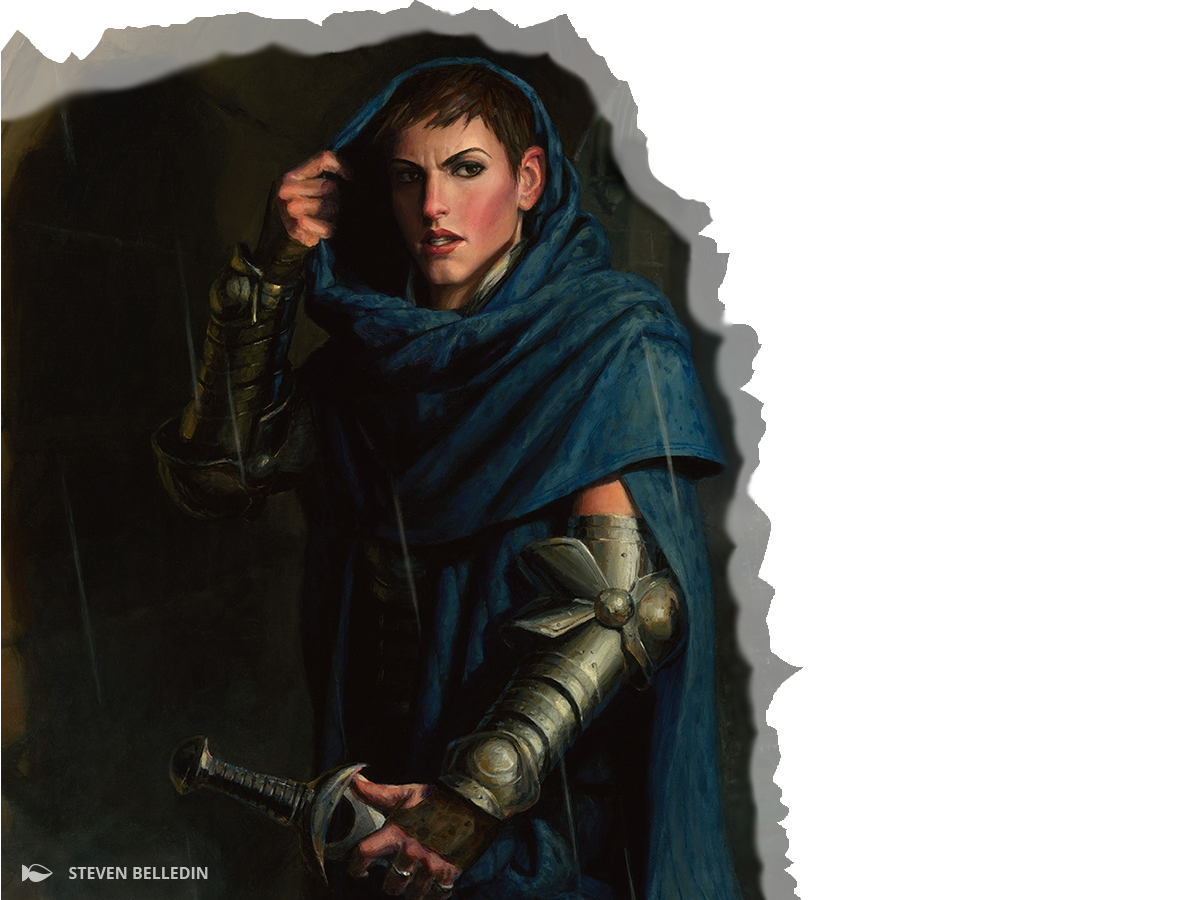
You are also able to notice details about a creature that are not immediately obvious. At either the start or end of your turn, you can ask one of the below questions about a focus. If you succeed on an Investigation check, you know the answer.
- 15 or higher: Is the creature's health below half?
- 20+: Can it move to 'x' location with its current speed?
- 25+: How is it affected by 'x' status effect or damage type?
- 30+: What spells is it under the effect of right now?
Prepared Defense
At 20th level, you can choose to not ask an Analysis question about a creature, and instead choose one of its known abilities. All friendly creatures that can hear you gain advantage on saving throws and the effect of the Dodge action against that ability until the start of your next turn.
In addition, you are always ready. You cannot be surprised. Gain a bonus to AC equal to your Intelligence modifier.
Valiant Presence: Apostle
Belief is the foundation that brings meaning to everything else. Apostles use their flame to exhort others, urging them onward with passion and conviction.
Words of Power
Starting at 3rd level, your zeal is carried in your words. As a bonus action, any trailblazer features that normally require you to be within 5 feet of a friendly creature now have a range of 30 feet. This benefit lasts until the start of your next turn.
Also, if you use this feature and still focus a flame or use a mindset benefit on a friendly creature while within 5 feet of it, it gains temporary hit points equal to half your trailblazer level + your Charisma modifier (minimum of 1). These hit points stack with other potential temporary hit points you grant at the same time.
Convincing Speech
Beginning at 6th level, you are able to quell the uncertainties of others with ease. When you are telling the full truth, you can cause non-hostile creatures to immediately believe you.
You can also uplift downtrodden allies. After spending a short rest with a conscious creature, it ignores a chosen condition until it leaves your presence or finishes a long rest. If the condition stacks, then it ignores 1 level of it instead.
Bedrock
At 11th level, gain immunity to the charmed and frightened conditions. If a creature attempts to frighten or charm you, build a fire die. In addition, while a creature has temporary health granted by your trailblazer features, it has advantage on saves against both the frightened and charmed conditions.
Lend Aid
Starting at 15th level, when you grant temporary hit points, you can grant the creature a number of hit points equal to half your trailblazer level. The creature can also roll a saving throw against an effect that a save can end.
You can use this feature a number of times equal to your Charisma modifier (minimum of 1). You regain all uses after finishing a long rest.
Unshakable Belief
At 20th level, your belief further strengthens those you assist. Whenever you grant a creature temporary hit points, it gains resistance to all damage until those hit points are depleted.
Valiant Presence: Emblem
Don't simply accept a role, aspire to be it. Emblems represent the ideal of their cause, leading with actions in order to serve as a model to others that might follow the same path.
Fire and Glory
Your valor drives you forward in combat. From 3rd level onwards, if you have 1 or more flames built, you can make an attack roll as a bonus action, using Charisma as your ability modifier. If the attack misses, lose 1 flame. If it hits, you must use your Scorch feature against the target.
Reassuring Demeanor
At 6th level, you are a constant reminder that there's hope, no matter the circumstance. You have advantage on ability checks to soothe or comfort others. Also, if a frightened friendly creature can see you or communicate with you, it can use its action to end the frightened condition on itself as long as you are not frightened or incapacitated.
Spirited Combatant
Starting at 11th level, you flame pushes you to strike, and strike hard. Once per turn when you use your Scorch feature, deal an additional flame die of damage.
Comeuppance
At 15th level, you and your allies team up to deliver a mortal blow to a debilitated enemy. If you are within melee range of a creature that has a condition granting advantage on attacks against it, every hit against it by you or a friendly focus deals an additional flame die of damage.
Staggering Persona
At 20th level, no matter whether the creatures you meet are hostile or friendly, they are awed by your presence. If a creature with an Intelligence above 5 and a CR of 5 or lower knowingly makes a roll against you, it rolls at disadvantage.
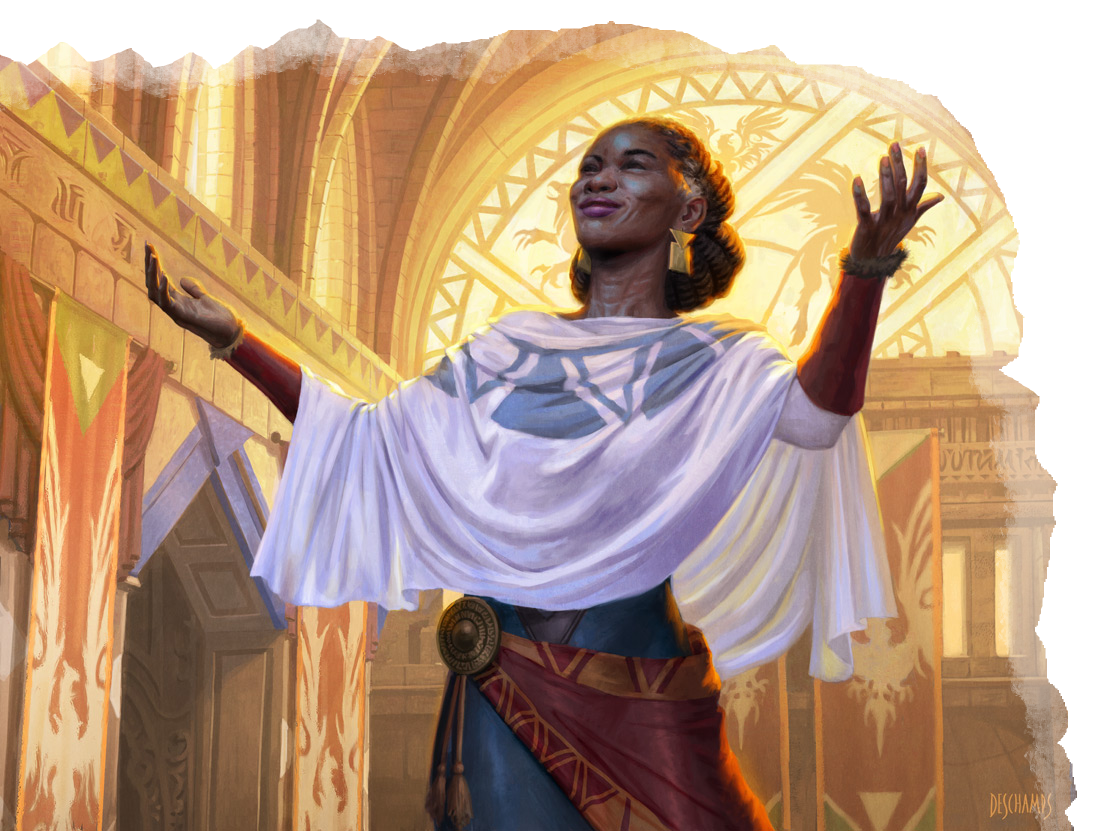
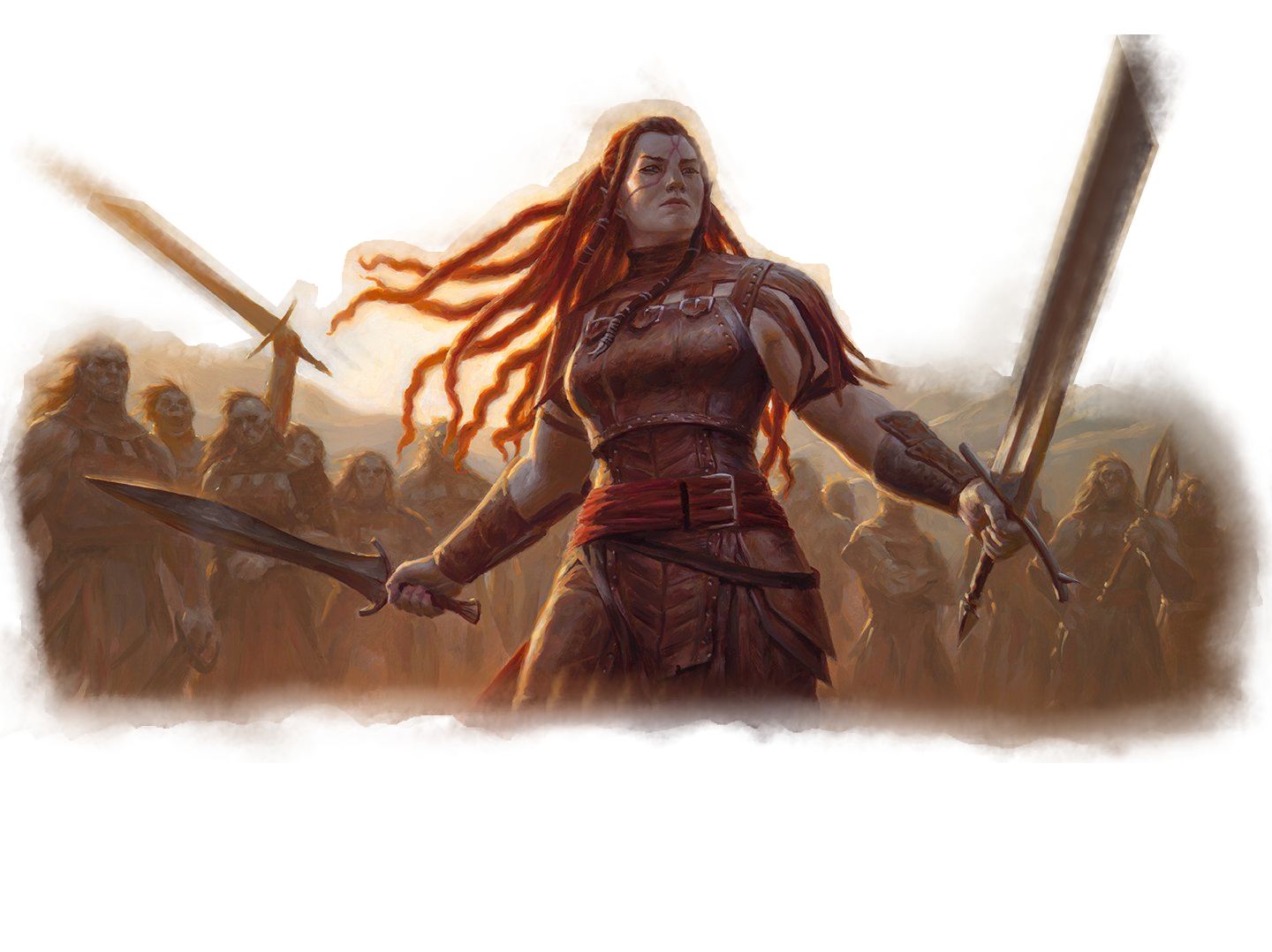
Mindsets
Trailblazers are driven to accomplish, allowing them to excel at an activity based on their current mindset.
Choose from the following. You can switch out a single mindset for another one whenever you finish a long rest.
Anchor
As an action, you can grant yourself or a friendly focus within 5 feet either +2 to AC or advantage on saves rolled against a condition of your choice, such as poison. The creature also gains temporary hit points equal to your guiding modifier + your trailblazer level, and if it is a friendly focus, your focus on it lasts even if you lose track of it.
The benefit lasts for the next minute or until you are no longer focusing on it. You can't use this feature again until you finish a short or long rest.
Starting at 11th level, grant both +2 to AC and advantage on saves against a condition of your choice.
Cripple
When you attack a hostile focus, you can attempt to guide the attack. If the attack hits, the creature must make a saving throw against 8 + proficiency + your guiding modifier. If the attack was melee, it rolls with disadvantage. If the creature is immune to being prone, it automatically succeeds.
If it fails the save, the creature's speed is halved, it cannot move upward, and it cannot use the Dash or Disengage action until the start of your next turn. Once you attempt to use this feature on a creature, you can't use it again until you finish a short or long rest.
At 11th level, the creature is also knocked prone if it fails the saving throw.
Help
You can use Help as a bonus action to aid a friendly focus. Alternatively, you can provide lingering assistance. If you choose to use Help as an action, the benefit granted by Help can be used a number of times equal to your guiding modifier.
At 11th level, you can spend a minute exhorting a creature about a task, giving it advantage on up to 3 skill checks of its choice related to that task before it finishes a long rest. You must finish a long rest before using this feature again.
Outlast
When you extinguish flames to increase one of your damage rolls, gain temporary hit points equal to the result of the highest roll. If the result is below your guiding modifier, gain temporary hit points equal to your guiding modifier instead.
At 11th level, gain temporary hit points equal to the result of your highest roll + your guiding modifier.
Rally (requires level 7)
When a friendly focus first becomes affected by a condition that a saving throw can end, you can end the condition as an action if you are within 5 feet of the creature. You must do so before the end of your next turn. You can use this feature a number of times equal to your guiding modifier. You regain all uses after finishing a long rest.
At 11th level, if you are within 5 feet of the creature when the effect is applied, you can use this feature as a reaction.
Ethos Mindsets
These Mindsets are only available to their specified ethos.
Diehard: Defy
When you are at 0 hit points and not stabilized, you stay ablaze. In this state, you build flames only from succeeding on death saving throws, and can extinguish a flame to increase any result besides 1. If this causes the result to be a 20 or above, you becomes conscious with 1 hit point.
At 11th level, you must fail 5 death saving throws to die, instead of 3. You still only require 3 successes to stabilize.
Firebrand: Taunt
When you hit a hostile focus within 30 feet, you can draw its attention. Roll a Charisma (Performance) check contested by its Insight. If the creature speaks the same language as you, you can use Intelligence as your ability modifier.
If you succeed, the creature loses awareness of all other creatures besides you until it attacks you, targets you with an ability, or it is attacked by another creature.
At 11th level, the creature must deal damage to you or be dealt damage by another creature to end the effect.
Guerilla: Feint
When you move while hidden, roll an Intelligence (Stealth) check. If you fail, you are no longer hidden. If you succeed, hostile creatures believe you are in a plausible location within 20 feet of your starting location. If a creature attacks that location, it realizes you are not there, but you can attack it with advantage as a bonus action on your next turn.
At 11th level, you can spend half your movement speed to roll the Intelligence (Stealth) check with advantage.
Visionary: Disrupt
When you hit a hostile focus while it is that creature's turn, you can extinguish a flame to reduce all damage rolls it makes until the end of its turn, (minimum of your Intelligence modifier) instead of to increase your own damage.
At 11th level, it also has disadvantage on its next attack roll.
Apostle: Rescue
When a friendly focus is dealt damage, you can dash toward it as a reaction. If you move within 5 feet of it, all your flames are extinguished. It gains temporary hit points equal to the extinguished flames + your Charisma modifier, plus an additional flame die for every opportunity attack you took while dashing. If it's health would have dropped to 0 before gaining the hit points, it is set to 1 instead.
Once you use this feature on a creature, you must finish a long rest before you can use it on that same creature again.
At 11th level, you roll double the flame dice when calculating hit points granted.
Emblem: Intervene
If a friendly focus within half your movement speed is attacked, you can extinguish a flame to move to its location as a reaction and take the attack instead, allowing your focus to move 5 feet in any direction without provoking Opportunity Attacks. During this reaction, reduce all damage you take by the flame + your Charisma modifier (minimum of 1).
At 11th level, if you are also focusing on the attacker, the attack is at disadvantage.
Shrewd Presence Mindsets
This Mindsets can be chosen if you chose Shrewd Presence.
Disorient
You can be focused on two hostile creature at once.
When you hit a creature you are focusing on, it can't use reactions against you until the end of your next turn. Also, all hostile focuses have disadvantage on rolls to hide from you.
At 11th level, you can focused on up to three at once.
Instruct or Unsettle (requires level 7)
When you or a creature you are focusing on rolls a saving throw, a flame can be extinguished to increase or decrease the roll. Once a creature is affected by this feature, it can't be affected again until you finish a long rest.
At 11th level, you can use this feature again on yourself after finishing a short or long rest.
Overwhelm
If a hostile focus is dealt damage by two or more friendly creatures besides yourself since the end of your last turn, you can add your Intelligence modifier to damage rolls against it on your turn. Additionally, you can reroll any 1s that result from any dice you roll to deal that damage.
At 11th level, you can also reroll 2s from the damage dice.
Warn (exploration)
When you build a flame outside of combat, you can extinguish it over the course of 1 minute to Warn a number of creatures equal to your Intelligence modifier.
Warned creatures gain temporary hit points equal to your trailblazer level, advantage on Perception checks and a +5 to Passive Perception, and they can add your Intelligence modifier to their Initiative rolls for the next hour or until the temporary hit points are depleted. You must finish a short or long before using this feature again.
At 11th level, this feature only needs a round to take effect.
Valiant Presence Mindsets
This Mindsets can be chosen if you chose Valiant Presence.
Avenge
If a hostile focus has dealt damage to two more more friendly creatures, which could include yourself, since the end of your last turn, your first attack against it on your turn crits on a 19 or 20. You can choose to preemptively extinguish one or more flames before rolling the attack. If the attack hits, roll double the flame dice in damage. On a miss, the flames do nothing.
At 11th level, the attack critically hits on an 18, 19, or 20.
Empower
You can be focused on two friendly creatures at once.
When you use the Attack action and hit, you can grant an attack roll to a friendly focus if it uses its reaction. The creature can add the result of a single flame die to both its attack and damage roll. Once you use this feature, you must finish a short or long rest before using it again.
At 11th level, you can be focused on up to three at once.
Fortify or Hinder (requires level 7)
When you or a creature you are focusing on attacks, a flame can be extinguished to increase or decrease the roll. Once a creature is affected by this feature, it can't be affected again until you finish a long rest.
At 11th level, you can use this feature again on yourself after finishing a short or long rest.
Hearten (exploration)
When you build a flame outside of combat, you can extinguish it over the course of a minute to Hearten a number of creatures equal to your Charisma modifier.
Heartened creatures gain temporary hit points equal to your trailblazer level for the next hour, and gain 10 feet of movement speed and advantage on saving throws against natural elements until the temporary hit points are gone. You must finish a short or long before using this feature again.
At 11th level, this feature only needs a round to take effect.
Bonus Ethos: Steward
The steward works with a partner, pushing them to excel.
Battlefield Partner
You've done a bit of fighting, and it's not for you. But helping others fight? That's something you can get behind. At 3rd level, you can use a bonus action to mark a friendly creature as your partner. The mark lasts until your partner dies, you lose track of your partner, or you mark someone else.
When you are capable of using an action on your turn but choose not to, your partner can used an enhanced version of either the Attack, Dash, or Dodge action on its next turn as long as it is within 60 feet of you when it uses the action.
At 11th level, this range increase to 120 feet.
Prepared for Danger
Starting at 6th level, you and your battlefield partner cannot be surprised if your opposite is not surprised. Additionally, you are able to efficiently direct others in chaotic situations. When multiple voices or sounds are occurring at once, everyone within earshot will still be able to pick out and understand what you say.
Lasting Camaraderie
At 11th level, you have developed enduring chemistry with someone. Choose a friendly creature as a comrade. While you are within 60 feet of each other, you implicitly each know the other's location and general state of mind.
If you have no current partner, you automatically mark your comrade, assuming you are able to do so. If your comrade is your partner, they gain all benefits of your 1st level Flame feature, but can only gain up to 1 flame, which stays at a d4.
You can pick a new comrade at any time. However, they only gain the benefits of this feature after a day has passed.
Tag Team
At 15th level, you work in concert with your partner. You can use your reaction to do one of the following at the start of your partner's turn.
Supporting Fire
Make a single weapon attack against a hostile creature, using your guiding modifier as your ability score for the attack. If it hits, it deals no damage, but the creature has disadvantage on all saving throws before the end of this turn.
Shrewd: If the creature is a hostile focus, the attack also deals damage equal to your flame die + Intelligence modifier.
Flanking Maneuver
Move up to half your speed. If you end your movement within 5 feet of a hostile creature, your partner has advantage on its first attack against it on this turn.
Valiant: you can use this feature as a reaction to the start of a friendly focus's turn, granting the advantage to the focus.
Double the Fun
At 20th level, you can have up to two creatures marked as partners at once. If you don't use an action on your turn, they both can use enhanced actions on their turns.
Why Is This Ethos Way Down Here?
The Steward was added after the class was finished. It was placed here because the author is too lazy to reformat, much like a certain, unnamed ethos is too lazy to hit things. Kidding aside, it also has a distinctly passive playstyle that might not work as well for some players, so it will not be for everyone.
Enhanced Actions
Your partner can use one of the following enhanced actions.
Attack
Your partner attacks an additional time. At 5th level, they instead attack two additional times. You can focus on hostile creatures as if you were the one attacking, and these attacks count as your own for the purposes of staying ablaze.
Dash
Your partner also gains the effects of the Disengage action.
Valiant: If you are focusing on your partner, they also have advantage on any ability checks or saving throws they roll until the end of their turn.
Dodge
If a creature attacks your partner at disadvantage and misses, your partner can attack it as a reaction.
Shrewd: If the creature is a hostile focus, your partner's attack has advantage. If both rolls would hit, the creature is stunned until the start of its next turn.
Steward Mindset: Boost
When you focus a flame on a friendly creature, it can move up to half its speed as a reaction. If it does so and does not use the flame before the next creature in turn order acts, the flame die disappears with no benefit.
At 11th level, if the creature is your partner, it can move up to its speed instead.
Focus Style: Guardian
At 3rd level, you can choose this in place of your current Focus Style.
When a friendly focus is attacked, impose disadvantage on the attack as a reaction. If the attack misses, your focus can use its reaction to attack the creature. If it is your partner, it can add your guiding modifier to its attack roll.
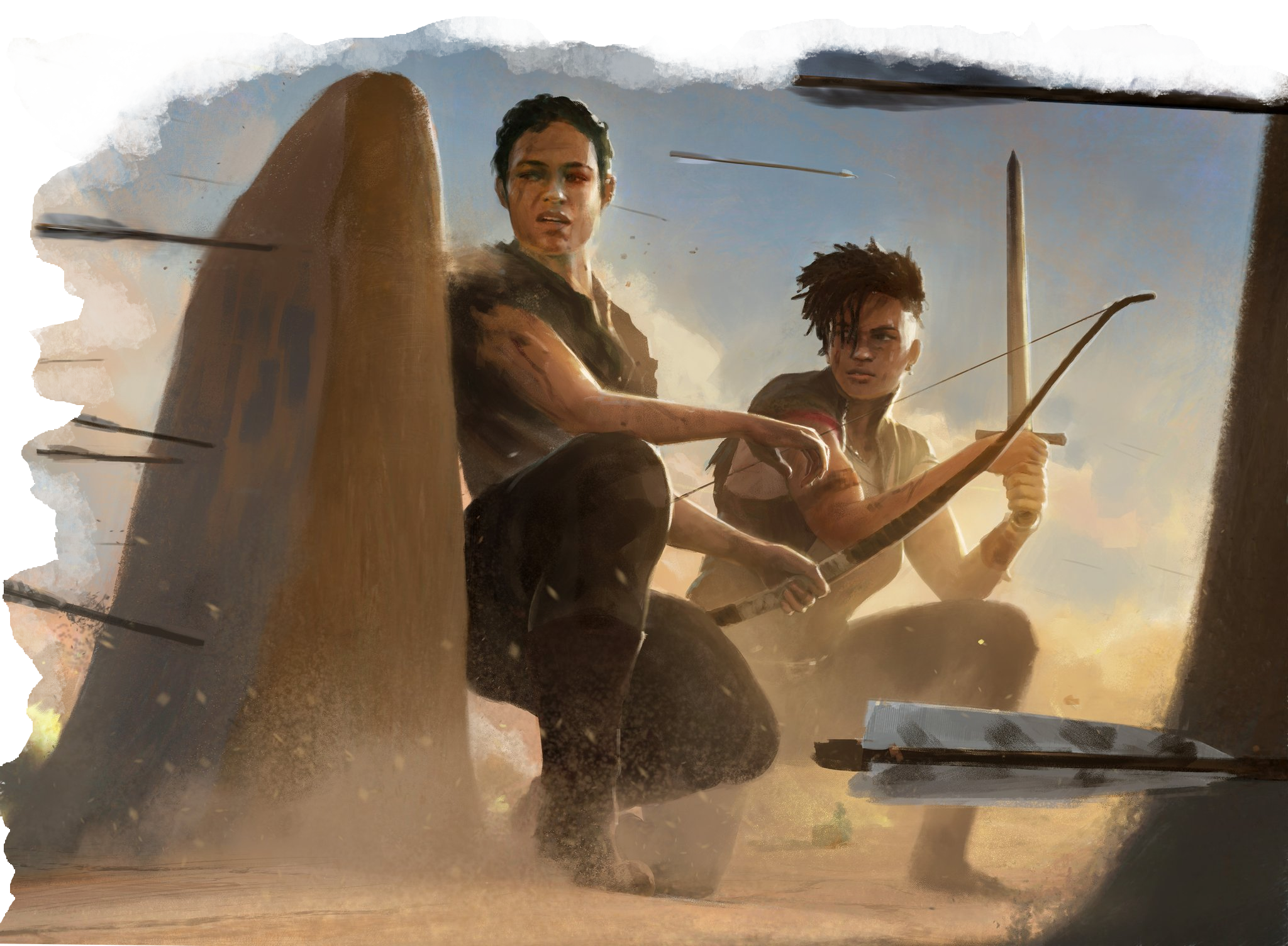
Feats: Combat Approach
You develop an approach that represents your preferred style of combat. You must be ablaze to gain the benefits of the feature, and must meet a statistical prerequisite to choose one of these feats. You can only have one combat approach.
Sudden Blitz
Prerequisite: 13 Strength
You can use two bonus actions on one turn as long as they are different actions. If you do, you cannot use any bonus actions on your next turn.
In addition, you can Shove as a bonus action if you extinguish a flame, adding the die's result to your roll.
Quick Reactions
Prerequisite: 13 Dexterity or 13 Intelligence
You can Disengage and Interact with Objects as bonus actions.
Additionally, you can spend half your movement to move 5 feet without provoking opportunity attacks. You can also move 5 feet without provoking opportunity attacks as a reaction to taking damage from a hostile creature.
Battlefield Shift
Prerequisite: 13 Dexterity or 13 Charisma
When you hit a creature, a willing creature other than yourself that is within 10 feet of your target can move 5 feet without provoking opportunity attacks from your target.
Additionally, once per turn when you melee attack a creature, roll Acrobatics against Acrobatics or Athletics. On a success, you and the target each move 5 feet to locations of your choice without provoking opportunity attacks. You must remain within melee range of the creature after moving.
Bloodlust
Prerequisite: 13 Charisma or 13 Strength
When your turn ends, you can choose a creature you attacked but did not hit on your turn. You gain advantage on attacks against it and disadvantage on all other attacks until you hit it, it dies, or you choose to drop your bloodlust.
Additionally, if you hit a creature that is the target of your bloodlust, add your guiding modifier to the damage roll.
Constant Scheming
Prerequisite: 13 Intelligence
At the start of each round, you can either swap your turn order with a willing creature or you can move your turn directly after a creature whose Initiative is lower than yours.
Additionally, either you or a friendly focus can roll Initiative at the end of their turn, using the new result at the start of the next round. You can only use this feature once per combat.
Stand Firm
Prerequisite: 13 Constitution
If you did not move on your turn and have taken damage at least once since then, you can Dodge as a reaction to being targeted by a hostile creature.
Additionally, once per round when you are attacked or forced to roll a saving throw, you can choose to be hit or fail the save, but gain resistance to any damage dealt.
Appendix: Actions
A reference for actions mentioned in the trailblazer class.
Dodge
When you take the Dodge action, you focus entirely on avoiding attacks. Until the start of your next turn, any Attack roll made against you has disadvantage if you can see the attacker, and you make Dexterity Saving Throws with advantage. You lose this benefit if you are Incapacitated (as explained in Conditions ) or if your speed drops to 0.
Help
You can lend your aid to another creature in the completion of a task. When you take the Help action, the creature you aid gains advantage on the next ability check it makes to perform the task you are helping with, provided that it makes the check before the start of your next turn.
Alternatively, you can aid a friendly creature in attacking a creature within 5 feet of you. You feint, distract the target, or in some other way team up to make your ally's attack more effective. If your ally attacks the target before your next turn, the first attack roll is made with advantage.
Hide
When you take the Hide action, you make a Dexterity (Stealth) check in an attempt to hide, following the rules for Hiding. If you succeed, you gain certain benefits, as described in the “Unseen Attackers and Targets” section.
Ready (an excerpt)
First, you decide what perceivable circumstance will trigger your reaction. Then, you choose the action you will take in response to that trigger, or you choose to move up to your speed in response to it. Examples include “If the cultist steps on the trapdoor, I'll pull the lever that opens it,” and “If the goblin steps next to me, I move away.”
When the trigger occurs, you can either take your reaction right after the trigger finishes or ignore the trigger. Remember that you can take only one reaction per round.
Shove
Using the attack action, you can make a special melee attack to shove a creature, either to knock it prone or push it away from you. If you’re able to make multiple attacks with the Attack action, this Attack replaces one of them.
The target must be no more than one size larger than you and must be within your reach. Instead of making an attack roll, you make a Strength (Athletics) check contested by the target’s Strength (Athletics) or Dexterity (Acrobatics) check (the target chooses the ability to use). If you win the contest, you either knock the target prone or push it 5 feet away from you.
Use an Object
You normally interact with an object while doing something else, such as when you draw a sword as part of an Attack. When an object requires your action for its use, you take the Use an Object action. This action is also useful when you want to interact with more than one object on Your Turn.
Credits
Written, directed, and produced by ControlZero. Please clap.
Images
The following are images that I found on mtgpics.com and believe to be okay to use under WOTC's Fan Policy. If I am mistaken for whatever reason, I am totally willing to remove or change them in order to respect copyright.
- Page 1: Niko Defies Destiny by Bastien L. Dehame
- Page 1: Maja, Bretagard Protector by Richard Luong
- Page 3: Scale the Heights by Cristi Balanescu
- Page 4: Shield of Kaldra by Donato Giancola
- Page 5: Saw It Coming by Randy Vargas
- Page 6: Lavinia, Azorius Renegade by Steven Belledin
- Page 7: Niambi, Esteened Speaker by Eric Deschamps
- Page 7: Radha, Heart of Keld by Chris Rahn
- Pages 9 and 12: Thwart the Grave by Wylie Beckert
- Page 10: Basri's Aegis by Paul Scott Canavan
Thanks To:
-
The designers of 4e Warlord, the only one of which I could find with a quick Google was lead designer Rob Heinsoo.
-
The D&D homebrewing platform GMBinder.com, which I used to format this document.
-
WOTC's policies, which lets me include pretty pictures.
-
Reddit user and noted homebrewer /u/KibblesTasty, whose core Warlord class mechanic Battlefield Presence was
stolenrepurposed for the Steward ethos. -
Everyone who has read this rather complicated and long class, and especially those who have played it or given feedback. I need all the help I can get!
Disclaimer
The Trailblazer is unofficial Fan Content permitted under the Fan Content Policy. Not approved/endorsed by Wizards. Portions of the materials used are property of Wizards of the Coast. ©Wizards of the Coast LLC.
"Balanced" Multiclass Rules
Requires Strength or Dexterity of 13 or higher, and Charisma or Intelligence of 13 or higher. Gain proficiency in light armor, medium armor, shields, and a martial weapon of your choice.
Other Stuff I've Made
- Goon: rogue subclass that mixes its trickery with force.
- Way of the Eternal Spirit: monk subclass that taps into the thoughts and feelings of past members.
- Helot: grim, slightly eldritch INT-based martial class that derives power from breaking the contraints of humanity.
- Cildraphytes: race of plant-like humanoids that alternate generations. Shadowfell Dragonborn variant also listed.
- The Bond: prestige class about an outside entity or presence being attached to you. Written quite casually.
Change Log
Sorted by date, from new to old.
2023-12-20
- Changed the intro a tiny bit and took away space between features so that the formatting works again
2021-08-19: Simplified the Flame Pool
- Corrected too few typos and edited not enough wordings
- Changed Adamant ethos's name to Diehard
- Changed flames to require much less micromanaging by sharing all flames between the trailblazer and all focuses
2021-04-11: Focus Edit and Minor Tuning
- Corrected too few typos and edited not enough wordings
- Rewrote the intros to each ethos to be less bland
- Nerfed the Cripple mindset to be usable once a short rest
- Slightly edited the presence benefits for Grazing Blow
- Changed Focus Flame... it now has limits on number of focuses, instead of lasting for a limited amount of time
2021-03-04: Now With Pictures!
- Corrected too few typos and edited not enough wordings
- Slightly reworked flame dice to be more streamlined
- Added images, credits, and a change log. RIP old cover art (The Land of My Fathers -A.C. Michael, link is extra blurry)
